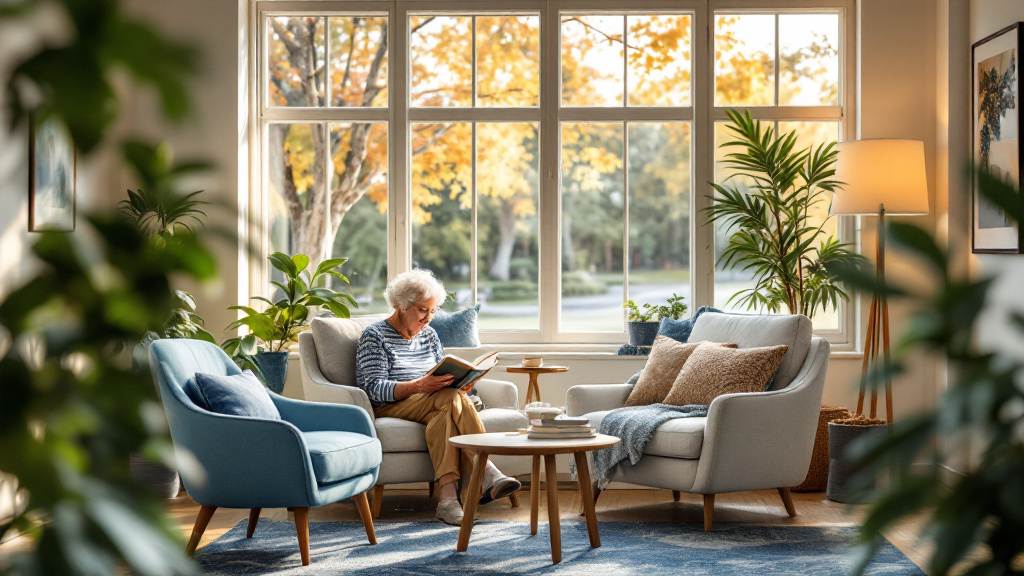
Mental Wellness Guidelines for the Elderly: Enhance Mental Health Now!
January 22, 2025
Discover how to improve mental health in elderly with practical tips for routine, social support, and resources.
Enhancing Mental Health in Elderly
For elderly individuals, improving mental wellness is essential for a fulfilling life. This section emphasizes the significance of maintaining a daily routine and the importance of staying active and connected.

Importance of Daily Routine
A structured daily routine plays a crucial role in enhancing mental health for older adults. Having a consistent schedule helps to provide stability and a sense of purpose. Engaging in regular activities, such as exercise, hobbies, and social interactions, contributes to overall well-being. Research indicates that a balanced day involving physical activity, intellectual engagement, and social connection can significantly uplift mental health [1].
Activity TypeBenefitsPhysical ExerciseBoosts mood, reduces anxietyIntellectual EngagementEnhances cognitive healthSocial InteractionReduces feelings of loneliness
Staying Active and Connected
Social connections are vital for elderly individuals to minimize the risks associated with social isolation and loneliness. Meaningful interactions promote positive mental health, increase life satisfaction, and diminish depressive symptoms. Effective ways to stay socially connected include participating in community programs, joining support groups, and utilizing technology for video calls.
Furthermore, older adults can engage in activities that foster connections, including creative arts groups, educational services, and volunteer opportunities. Regular participation in these social activities not only improves emotional health but also encourages a sense of belonging within the community.
Social ActivityExpected OutcomeCommunity EngagementEnhanced life satisfactionSupport GroupsReduced depressive symptomsVolunteeringIncreased social interaction
In summary, a structured routine combined with active social engagement can significantly enhance the mental health of elderly individuals. For more information on mental health challenges among older adults, including common conditions such as depression and anxiety, visit what is the most common mental illness in the elderly.

Social Support for Mental Health
Social support plays a vital role in enhancing the mental health of the elderly. Understanding both the impact of social isolation and the benefits of community participation can provide valuable insights on how to improve mental health in the elderly.
Impact of Social Isolation
Social isolation significantly affects the mental wellness of older adults. When seniors lack social interactions, they may experience increased feelings of loneliness and depression. Research indicates that socializing can offer mental health benefits, as engaging in community activities and interactions positively impacts the overall well-being of older adults.
A staggering number of seniors live alone, which amplifies the risk of social isolation effects. [How many seniors live alone] identifies that many elderly individuals experience solitude, leading to a heightened risk of depressive symptoms.
OutcomeEffect of Social IsolationIncreased LonelinessHighRisk of DepressionSignificantDecreased Life SatisfactionModerate
Community Participation Benefits
Active participation in community events demonstrates substantial benefits for elderly mental health. Studies reveal a clear relationship between social involvement and reduced depression risk in older individuals. Participation in social activities, such as volunteering and donations, often correlates with decreased depressive symptoms among seniors.
Older adults who frequently engage in community affairs report higher life satisfaction, increased positive emotions, and lower levels of depressive symptoms. Additionally, a strong sense of community has been shown to mediate the relationship between community participation and subjective well-being. Enhancing life satisfaction and reducing depressive symptoms are critical outcomes of strong community involvement.
BenefitImpact of Community ParticipationLife SatisfactionIncreasedPositive AffectEnhancedDepressive SymptomsDecreased
To encourage such participation, communities can organize social activities and events. Older adults are more likely to experience positive effects on their mental health when actively engaged with others, showcasing the need for supportive environments that promote social ties. Resources that highlight social activities and events in assisted living can assist caregivers and family members in helping seniors stay connected.
Utilizing social supports, including connections made through mental health support in assisted living and community resources, allows families and institutions to foster a nurturing atmosphere that combats isolation and enhances mental well-being for the elderly.

Resources for Seniors
Finding effective resources to support mental wellness is essential for elderly individuals. Access to online platforms and community programs provide valuable opportunities to enhance mental health in elderly populations.
Online Mental Health Platforms
Numerous online platforms and mobile applications exist today that cater to the mental health needs of seniors. Such digital resources can provide access to mental health programs, support services, and coping strategies tailored specifically for older adults. These online tools are particularly vital in combating loneliness, especially given the increased isolation many seniors have experienced due to circumstances like COVID-19 [3].
Some examples of online mental health resources for seniors include:
Resource TypeDescriptionTelehealth ServicesVirtual consultations with mental health professionals via video calls.Mobile AppsApps focusing on mindfulness, meditation, or cognitive exercises.Support GroupsOnline forums offering peer-to-peer support and community sharing.
Seniors should explore local and national resources, such as those provided by organizations like SAMHSA that offer evidence-based practices to address mental health challenges faced by older adults [4].
Programs in Senior Communities
Participation in community programs is another key avenue for improving mental health in elderly individuals. Engaging in local activities allows seniors to connect with peers, fostering social relationships that can positively impact their emotional well-being.
Community programs may include:
Program TypeDescriptionSenior Center ActivitiesSocial events, art classes, fitness programs, and game nights.Volunteering OpportunitiesParticipating in community service activities to enhance social connections.Support GroupsLocal meet-ups focusing on shared experiences and mental health discussions.
Research shows that community participation enhances subjective well-being for older adults by increasing their sense of community. Engaging in social activities can lead to higher life satisfaction and positive emotional experiences, while reducing depressive symptoms.
These resources are crucial in understanding how to improve mental health in elderly and can greatly enhance their quality of life through increased social engagement and support.
Addressing Mental Health Challenges
Recognizing Mental Health Conditions
Prompt recognition and treatment of mental health disorders in older adults is crucial for maintaining overall well-being. Various mental health conditions frequently affect seniors, and understanding these conditions can greatly enhance how to improve mental health in the elderly. Conditions such as depression, which affects about 10-25% of individuals over 65 years old, are particularly prevalent and can worsen with age, especially after 81 years old.
Mental Health ConditionPrevalence in Elderly PopulationMajor Depressive DisorderUp to 28.3% in some regionsSymptoms of Depression10-25%Post-Traumatic Stress Disorder (PTSD)5.5%Cognitive Impairments (associated with depression)15.9% of dementia patients
Recognizing these conditions early is essential for ensuring access to the right care and support systems. Engaging healthcare professionals and utilizing community-based resources can aid in effective management and treatment. For more information on the most common mental illnesses in the elderly, refer to our article on what is the most common mental illness in the elderly.
Dementia and Psychiatric Care
Dementia poses a significant concern for the elderly, with implications for their mental health. This condition frequently leads to cognitive decline and can trigger additional psychiatric symptoms, including depression and psychosis [2]. The need for quality mental health care becomes apparent, as dementia can complicate existing mental health disorders and create new challenges.
The prevalence of major depressive disorder among dementia patients is particularly alarming, reaching 15.9%. This not only leads to a decline in the overall quality of life but also increases the demand for more comprehensive care and support services. Both dementia and associated mental health issues necessitate access to specialized psychiatric care to address these challenges effectively.
Community participation, family involvement, and specialized mental health services all play vital roles in supporting seniors facing these challenges. For more information on how assisted living can support mental wellness, see our article on how assisted living supports senior mental wellness. Providing tailored interventions in a timely manner can promote healthier mental outcomes among the elderly population.
Preventing Mental Health Issues
Promoting mental well-being in the elderly is crucial for enhancing their overall quality of life. Recognizing and addressing factors that can contribute to mental health issues is essential for preventing complications.
Combatting Loneliness
Loneliness is a significant concern for the elderly, particularly after changes in living arrangements or during isolating events like the COVID-19 pandemic. Reports indicate that increased isolation can severely impact the mental health of older adults [3]. It is estimated that a considerable number of seniors, approximately 28% of those over 60, live alone, potentially heightening feelings of loneliness.
Effective interventions against loneliness include:
Social participation has shown to foster a sense of community, which can significantly enhance mental health by providing emotional support and connection. Research indicates that elderly individuals involved in social support and community participation experience lower levels of depression compared to those who are isolated [8]. Various programs, such as social activities and events in assisted living, are tailored to combat loneliness and enhance social engagement among seniors.
Recognizing Warning Signs
Proactive approaches to mental health require recognizing the warning signs of potential mental health issues. More than 20% of adults over 60 have some form of mental or neurological disorder [3]. Common warning signs include:
Warning SignsDescriptionChanges in moodIncreased sadness, irritability, or anxietyWithdrawalAvoiding social activities or family interactionsLack of interestLoss of interest in hobbies or activities previously enjoyedChanges in sleep patternsInsomnia or excessive sleepingDecline in self-careNeglecting personal hygiene or nutrition
Prompt identification of these signs enables caregivers and family members to take necessary actions, such as consulting with mental health professionals or exploring resources for mental health support in assisted living.
Awareness and active participation in community activities can empower seniors, helping them to combat loneliness and address mental health challenges effectively. For additional insights on enhancing mental wellness, refer to our article on how assisted living promotes cognitive health.
Support and Interventions
Addressing mental health in the elderly requires a combination of family involvement and professional support. By integrating these approaches, it is possible to enhance overall wellbeing and improve the mental health of seniors.
Family Involvement
Family plays a critical role in supporting mental wellness in older adults. Engaging with family members can provide emotional support, reduce feelings of loneliness, and encourage participation in social activities. When families take an active role, they help amplify their loved ones’ sense of belonging and value.
Benefits of Family InvolvementDescriptionEmotional SupportProvides comfort and reassurance to the elderly individual, reducing feelings of isolation.Social EngagementEncourages participation in family gatherings, outings, and activities, enhancing social connections.Monitoring Mental HealthFamily members can observe changes in behavior or mood, enabling early intervention for mental health issues.Assistance with CareHelps elderly individuals manage daily tasks, maintain routines, and access resources.
Family members should be educated about common mental health concerns affecting seniors. Awareness of conditions such as depression and anxiety can facilitate timely discussions about seeking professional help when necessary. Resources on the most common mental illness in the elderly can provide additional insights.
Specialized Mental Health Services
Professional mental health services are essential in addressing more complex tasks within elderly care. Specialized services often include therapy, counseling, and medication management, tailored specifically to the senior population. This professional support can be crucial for individuals experiencing conditions such as major depression or anxiety disorders.
Here are additional resources for seniors seeking specialized mental health support:
Service TypeDescriptionPsychotherapyInvolves talking with a trained therapist to explore feelings, behaviors, and coping strategies.Group TherapyProvides a supportive environment where seniors can share experiences and learn from one another.Psychiatric ServicesOffers medical evaluation and treatment for mental health disorders, including medication management.Community Mental Health ProgramsProvided through local agencies that may offer therapy, psychiatric support, and educational workshops.
Several programs prioritize the mental health of seniors, especially those facing challenges such as social isolation and the effects of aging. Families should consider research on mental health support in assisted living to understand available options. Single seniors, particularly those aging alone, may benefit from an enhanced understanding of how many seniors live alone and the associated mental health risks.
Combining family involvement with specialized mental health services can significantly improve seniors’ overall mental health. By supporting each other and utilizing professional resources, families can create a robust support system that promotes mental wellness among elderly individuals.
References
[2]:
[3]:
[4]:
[5]:
[6]:
[7]:
[8]:



































































































